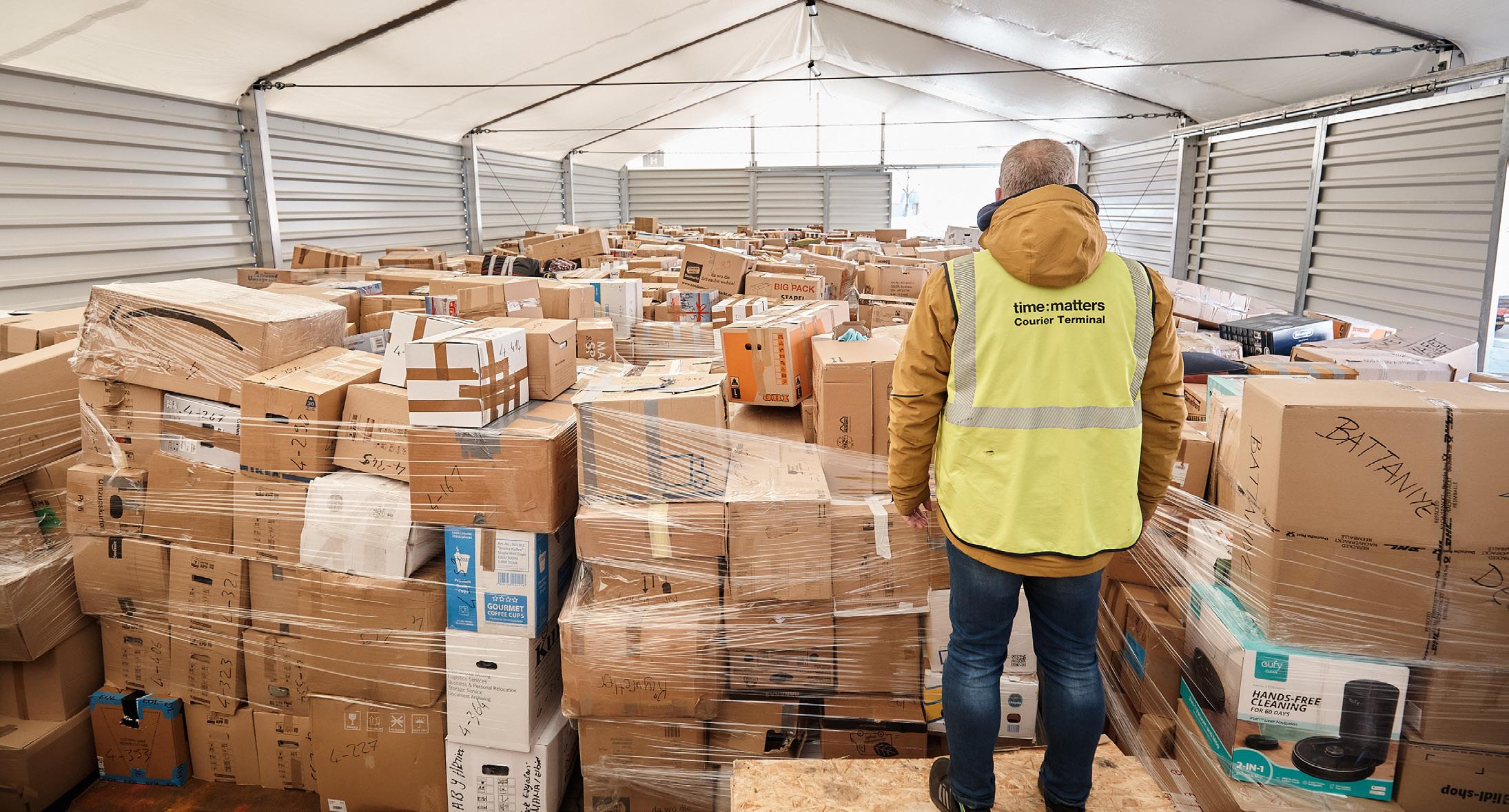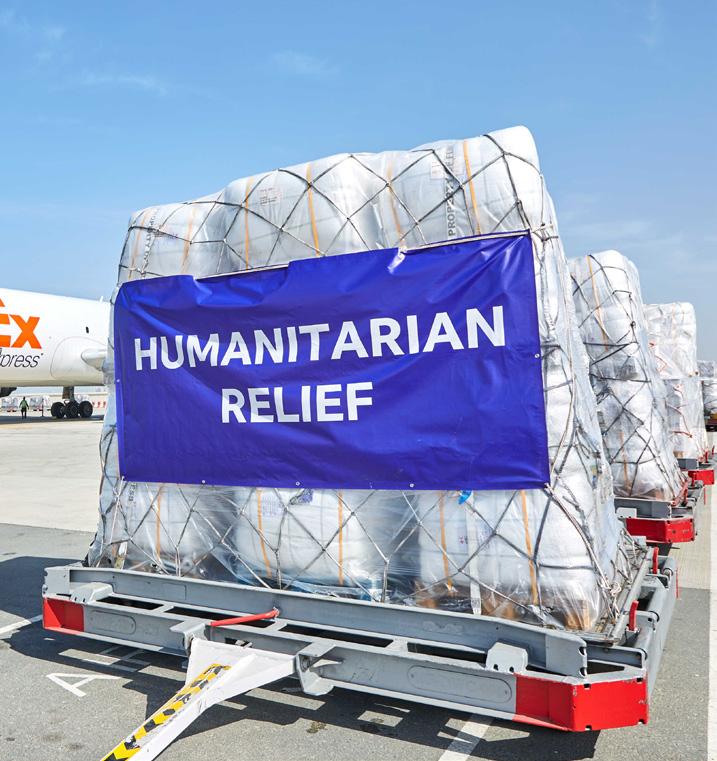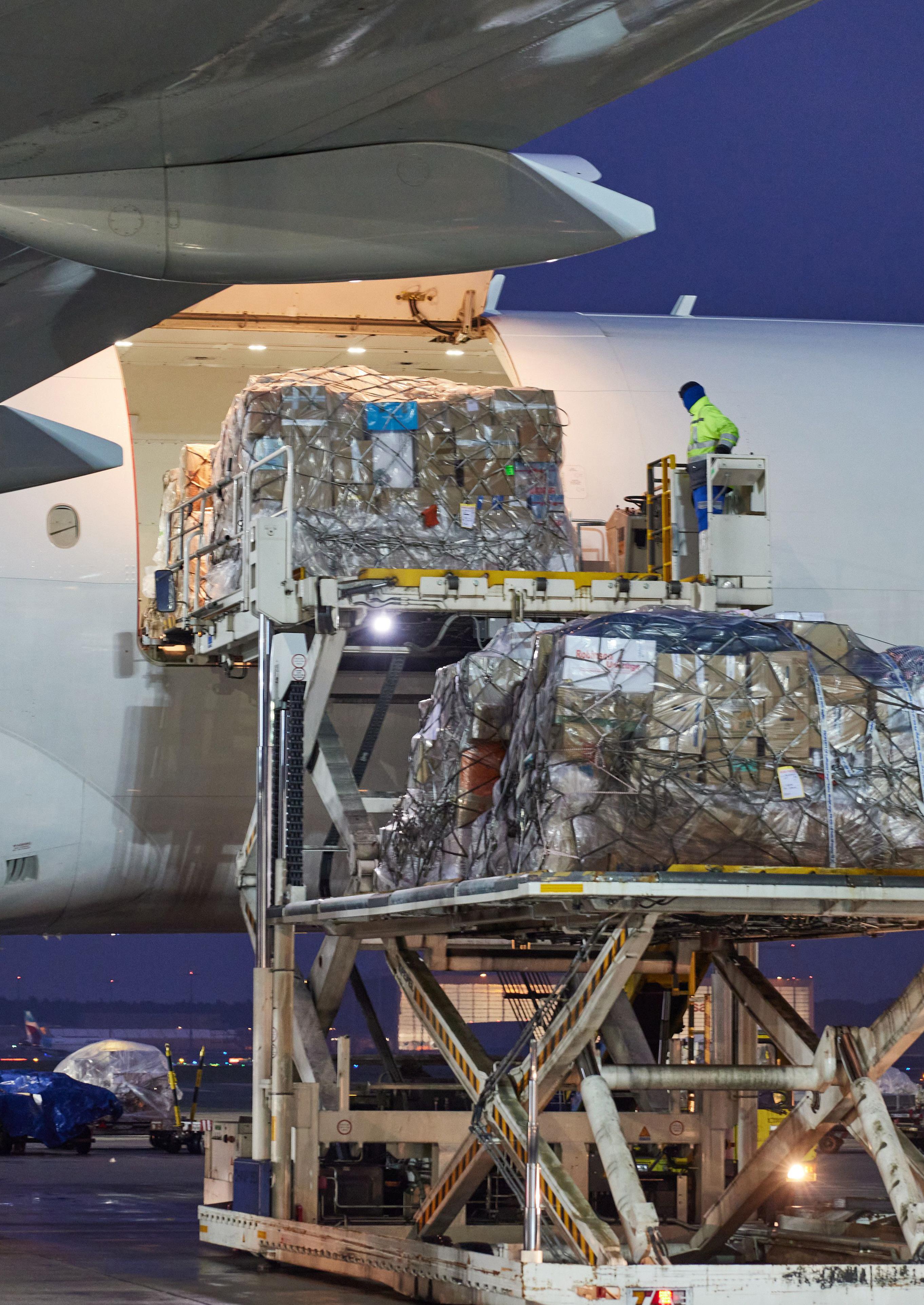
4 minute read
Airlines and industry partners respond to Turkiye-Syria earthquake crisis
On 6 February 2023, a devastating 7.8-magnitude earthquake hit the Turkish city of Gaziantep in Kahramanmaras province, near the border of southern Turkiye and northern Syria. This was followed by a second tremor, measuring 7.5, just a few hours later some 80 miles north of the first. This would be the catalyst for the series of aftershocks over the next few days that would leave serious fatalities, massive infrastructure damage and huge economic ramifications.
With Turkiye sitting in the middle of the east and west, it wasn’t too long before the aviation and air cargo community, together with their respective crisis relief and logistics partners, sprung into action to provide urgent airlift for relief supplies. Over the next 10 days after the first shock, numerous airlines and stakeholders deployed their assets and resources to carry out transport for rescue equipment and disaster relief supplies bound for Turkiye.
Global response
On 10 February, a Lufthansa Cargo Boeing 777 freighter, with flight number LH8332, departed Frankfurt (FRA) at 08:01 CET bound for Antalya Airport (AYT), where the aircraft is expected to arrive around 13:30 local time. The freighter took off fully loaded with relief supplies urgently needed on the ground, mainly winter clothing, blankets, food and hygiene items. The in-kind donations came from Turkish communities in Hesse and Baden-Württemberg, from companies in the region and from airline employees.
time:matters, a Lufthansa unit that specializes in emergency logistics, and customs service provider CB customs broker, which also belongs to the airline, organized the extensive relief operation. The Lufthansa Cargo team in Istanbul worked with Türkiye’s Disaster and Emergency Management Authority (AFAD), who brought the relief supplies to the crisis area.
IATA or the International Air Transport Association, a trade body that represents some 300 airlines that make up 83 percent of global air traffic, highlighted the important contributions from the aviation industry to the relief efforts. On social media, IATA member airlines from Europe, the Middle East and Asia posted videos of their ground operations, including the likes of Qatar AIrways, Mongolian Airlines, and Wamos Air.
In Dubai, Emirates had started setting up an air bridge together with the International Humanitarian City (IHC), to transport urgent relief supplies, medical items and equipment to support on-ground efforts and search and rescue activities in Turkiye and Syria. The first shipments consisted of high thermal blankets and family tents and relief cargo of medical kits and shelter items, which had been coordinated by the IHC together with the world’s top humanitarian organizations. The critical emergency supplies were loaded onto flights EK121 and EK-117, which were then delivered to local organisations for distribution to affected areas.
Charters and express deliver
Halfway across the world, global express providers FedEx and UPS came to support the ongoing efforts. United Postal Service operated an airbridge to Istanbul from its European hub in Cologne, Germany and pledged more than US$1 million in global logistics services. It also transported food, healthcare and shelter supplies to Türkiye from its main air hub in Louisville, Kentucky. On the ground, the company offered transport capacity on UPS lorries for the Istanbul city government, Turkish Red Crescent and a local nonprofit.
Over the next few weeks after the first tremor, charter operators took on the mission of providing airlift for the rescue party and transporting essential humanitarian aid from all over the globe. By the following month, UK-based Air Charter Service had arranged more than 40 charter flights, flying in search and rescue teams and delivering more than 2,000 tonnes of humanitarian cargo on behalf of governments and nonprofit organisations.
“We started receiving calls for help early on Monday, before the second earthquake had struck,” said Ben Dinsdale, Director of Government and Humanitarian Service. “For the search and rescue personnel ready to go, Gaziantep Airport— nearest the epicentre—was still fully operational. By the following day we had flown German and British teams there, as well as someone from our Frankfurt office to oversee the smooth operation of the following charters.”
“Later in the week we started flying in relief cargo, with our first flight being an entire field hospital on a Boeing 747 from Spain. We have now transported more than 2,000 tonnes of relief cargo on a wide variety of aircraft… The cargo flights have come from all around the globe, including Asia, the US, the Middle East, Northern Europe and even the Canary Islands. We still have several charters booked that will fly in the next couple of weeks.”
Not without roadblocks
Whilst airlines and the air cargo industry as a whole quickly demonstrated its role on the front line of humanitarian response, there were still some roadblocks that required much needed political attention. Syria being a war-torn area presented an obstacle for those who were flying over the country.
On 15 February, The International Air Cargo Association (TIACA) acknowledged the supporting efforts of the US Department of the Treasury’s Office of Foreign Assets Control which issued Syria General License 23. This blanket license would authorize all transactions related to earthquake relief that would be otherwise prohibited by the Syrian Sanctions Regulations (SySR) for 180 days, allowing aid to flow much quicker to the affected area.
With this obstacle removed, TIACA called upon the insurance markets to relax some of the stringent procedures and financial penalties in place when flying to Syria as a sanctioned state considered as a war zone.
“Flights need to get as close as possible to where the aid is needed, therefore flying to Damascus or Aleppo is vital to support Syrian relief efforts but with current Hull war risk premiums in place the financial impact is often too much for humanitarian agencies to bear.
We urge the insurance markets to follow the lead of the US Treasury department and remove the current penalty for a limited time period to support relief efforts.”
Air charter specialist Chapman
Freeborn also had to gain the necessary land permits, flyover rights and approvals from the Syria’ Civilian Aviation Authority and Ministry of Foreign Affairs so that thousands of tonnes of aid could reach the affected population.
The company is no stranger to emergency response, having supported humanitarian efforts for every major global crisis over the past 50 years. Despite dwindling capacities, it successfully chartered aid flights to the affected regions from the US, United Arab Emirates, Germany, Spain, Belgium, India, Saudi Arabia, Denmark, Singapore and the Philippines.

“The worldwide compassion expressed following this disaster just underlines all that is good amongst the human race,” expressed David Tasker, group director for government & humanitarian, Chapman Freeborn.
“The whole aviation industry and associated industries were quick to react, with Chapman Freeborn proud to be at the forefront with their support. The whole industry must be commended.”
In a statement, Ben Dinsdale, director of government and humanitarian services at ACS, commented: “it is times like these that we feel we can really help to make a difference in thousands of people’s lives. Hopefully we can, in some small way, make their lives slightly more bearable for now.”









